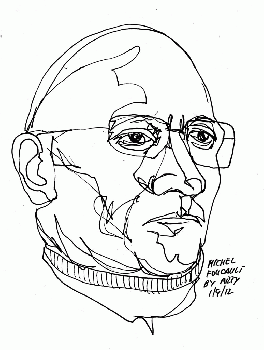Duluth, Minnesota (OpEdNews) July 3, 2021: My favorite scholar is the American Jesuit Renaissance specialist and cultural historian Walter J. Ong (1912-2003; Ph.D. in English, Harvard University, 1955).
See my lengthy OEN article "Walter J. Ong's Philosophical Thought" (dated September 20, 2020):
When Ong was researching his Harvard University doctoral dissertation on the French Renaissance logician and educational reformer and Protestant martyr Peter Ramus (1515-1572) and the history of logic, he lived at a Jesuit residence in Paris for three years (from November 17, 1950, to November 16, 1953).
On February 22, 1963, M. Jean Beliard, Consul General of France, acting on behalf of the French Ministre de l'Education Nationale dubbed Ong a knight for his "services rendered to French culture" in a ceremony at Saint Louis University.
Now, the French philosopher and cultural historian Michel Foucault (1926-1984) was elected to the prestigious College de France in 1969; he designated himself as concerned with the history of systems of thought. No doubt Foucault's works tend to be historical studies. His appointment in the prestigious College de France obliged him to present a course of public lectures once a year on his recent and ongoing research - in other words, work in progress.
Now, Alfred North Whitehead famously referred to Western philosophy as footnotes to Plato. Consequently, perhaps Western philosophy is one system of thought that Foucault may undertake to review as part of his promised program of examining the history of systems of thought. In effect, this is what Foucault begins to do in his inaugural lecture series represented in English translation in the 2013 book Lectures on the Will to Know: Lectures at the College de France 1970-1971 and "Oedipal Knowledge" edited by Daniel Defert; translated by Graham Burchell (New York: Palgrave Macmillan).
The scope of what Foucault has in mind by the expression the history systems of thought is indicated here by the inclusion of his essay "Oedipal Knowledge" (pages 229-261). For my present purposes, I should say here that Foucault's detailed discussion of Aristotle is admirably lucid (esp. pages 6-13; see the "Index of Names" [pages 292-293] for specific page references to Aristotle).
In addition to Foucault's admirably lucid lectures about Western philosophy (pages 1-228) and his essay on Sophocles' famous play, the 2013 book in English also includes an "Index of Notions" (pages 287-291) and an "Index of Names" (pages 292-293). Daniel Defert (born in 1937), Foucault's partner in life, provides an excellent essay titled "Course Context" (pages 262-286).
Defert (page 269) notes that the first volume of Foucault's History of Sexuality is also titled in French The Will to Know. However, the English translation is titled The History of Sexuality: Volume 1: An Introduction, translated by Robert Hurley (New York: Pantheon Books, 1978). Defert (pages 267-268) also discusses Foucault's thematizing the will to know in earlier lectures at different times and places.
Defert (page 264) also helpfully notes how Foucault draws on the thought of the German classicist and philosopher Friedrich Nietzsche (1844-1901). Defert says, "If we put together the aphorisms on which Foucault relies [from Nietzsche's various writings], we notice that Nietzsche actually placed genealogy at the heart of knowledge (connaissance), treating it as the 'knowledge (savoir) of science,' and did not make it merely a matter of the subversion of moral values. The real theme of this course [by Foucault in 1970-1971] would therefore be less the possibility of such a genealogy, than its effects on the theory of the subject and object at the foundation of the theory of knowledge, on our conception of truth since Plato [and Aristotle?], in a word, on philosophy itself."
Now, in effect, the Canadian Jesuit philosopher and theologian Bernard Lonergan (1904-1984) also considers Western philosophy as a system of thought to be examined and interrogated in his 1957 philosophical masterpiece Insight: A Study of Human Understanding. See the critical edition that is volume three of the Collected Works of Bernard Lonergan, edited by Frederick E. Crowe and Robert M. Doran (University of Toronto Press, 1992). On the title page, Lonergan quotes in Greek a certain key passage from Aristotle's De anima, III, 7, 431b 2 (page iii), which he discusses on pages 699-700. Even though Foucault examines numerous key passages in Aristotle's works, he does not happen to advert explicitly to this key passage that Lonergan considers to be so crucial.
In effect, Ong also considers Western philosophy as a system of thought to be examined and interrogated in his 1958 massively researched book Ramus, Method, and the Decay of Dialogue: From the Art of Discourse to the Art of Reason (Harvard University Press). Ong sees Ramus as pivotal in spreading aural to visual shift that spread in print culture in Western culture that emerged after the Gutenberg printing press emerged in the mid-1450s.
But Ong traces the aural to visual shift (pages 92-93, 104-112, 128, 151-156, 244-245, 273, 277-292, 307-314) and to the quantification of thought (pages 53-91, 184, 262, and 263) in the formal study of logic from Aristotle onward in Western philosophy. But it is also important to note that Ong does not himself subscribe to what he refers to variously as the corpuscular view of reality, the corpuscular epistemology, and the corpuscular psychology (pages 65-66, 72, 146, 171, 196, 203, 210, and 286) - and neither does Lonergan, who refers to such a view as naà �ve realism.
(Note: You can view every article as one long page if you sign up as an Advocate Member, or higher).





